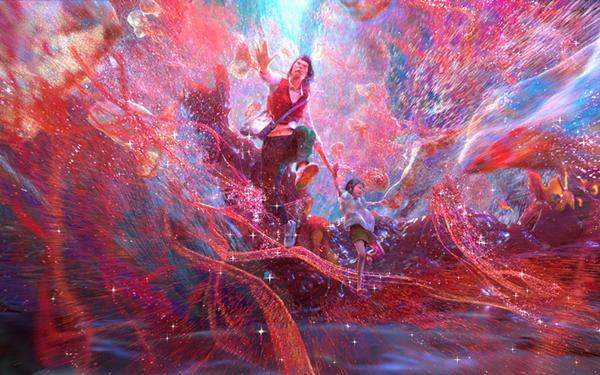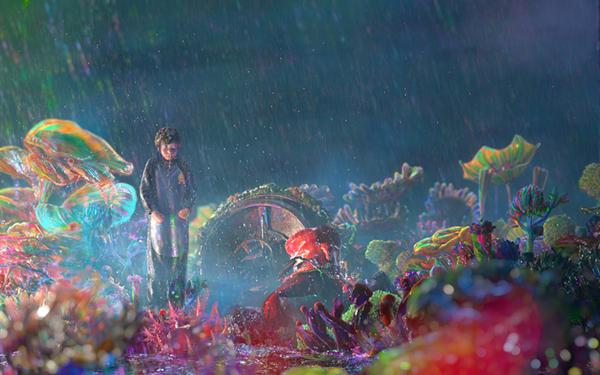'Deep Sea' director to share top animation effects with peers
- By Zhang Rui
 0 Comment(s)
0 Comment(s) Print
Print E-mail China.org.cn, February 13, 2023
E-mail China.org.cn, February 13, 2023
The director of the original animated feature "Deep Sea," which brought a visual spectacle to China's big screens recently, promised to share the visual effects technology his crew created with peers within the country's animation industry.

A dazzling scene from the animated film "Deep Sea." [Image courtesy of Coloroom Pictures]
The film, developed over seven years by Tian Xiaopeng, stunned audiences during the Spring Festival film season with its dazzling and immersive images. One unprecedented visual effect, "particle ink painting," particularly stood out for its representation of top-level Chinese animation production. The CG technique, invented and developed by Tian and his crew, creates 3D images from traditional abstract Chinese ink painting and was used throughout the film.
"I always said I want to break the boundary between 2D and 3D," the director said during an interview on Jan. 29. "Now 3D is a very mature industrial system, while 2D creation is very arbitrary. 'Particle ink painting' is therefore an attempt to make an organic combination of 3D and 2D, for which I did research and development over a very long time."
Tian added that he is willing to share the technology and experience with his Chinese peers. "We have come a long way, made mistakes, and had to overcome many challenges, but now we have such technology. It is not something to be kept a mystery. I don't want my peers to make the same mistakes to get there. I want to share the technology and my experiences with those who may want to use it. In China's animation industry, we are not competing with each other. We should share our experiences with each other and enhance our Chinese animators' competitiveness to compete internationally."
He admitted China's animation technology is not yet on par with Hollywood's animation making. "Some may hold the notion that we already have all the technologies we need for animation. But that's not true. We still need to develop more technologies to support Chinese animation; then we can go further in the future. We must lay down the foundation as trailblazers so that many genius animation directors can be freer to tell their stories in the future without worrying about technology."

Director Tian Xiaopeng takes a picture of his staff in a meeting during the creative process. Tian has qualities similar to that of the protagonist in "Deep Sea" in that he is gentle and sensitive but also a self-proclaimed loner. [Photo courtesy of Coloroom Pictures]
"Deep Sea" tells the unusual story of Shenxiu, a girl who has felt deep sadness since being abandoned by her mother. While on a family cruise, she falls into the sea and stumbles upon the Deep Sea restaurant and its inventive underwater chef Nanhe. The two embark on an amazing journey, which turns out to be a great dream that spans her real-life nightmares and near-death experience. The new fantasy film focuses on the theme of loneliness and depression and offers courage and comfort to those who suffer from such ailments.
The film has been selected as part of the Berlin International Film Festival's youth-focused sidebar Generation selection, where it will receive its international premiere, while Amsterdam-based sales outfit Fortissimo Films has secured international rights to the film.
While many Chinese viewers stated they were moved to tears at the end of the film, many others felt the story was too chaotic, unpleasant, dark, and heavy and didn't fit the festive atmosphere of the holiday and their longing for family entertainment. The director admitted they chose the wrong film season to debut, but the film's investors couldn't afford to wait longer to release it, as the film had already suffered several delays due to the COVID-19 pandemic and other issues.
As the creator of the milestone Chinese animated film "Monkey King: Hero is Back" (2015), many movie fans looked forward to Tian's follow-up and to seeing whether it could achieve the same success. Tian also became the animation director that many in the industry looked up to. However, even during a particularly lucrative Spring Festival season, "Deep Sea" has been unable to achieve its predecessor's phenomenal success, only grossing about 763 million yuan by Sunday and attracting mixed reviews.
Tian took responsibility for the film's reception, framing it as a seven-year self-driven adventure into visual experiments and artistic obsession. "I have a very big ambition to go beyond regular and neat animation filmmaking. I wanted to create something that echoed my emotions and feelings while sacrificing regular traditions and plot techniques. This was my choice, and I will accept the criticism and consequences. But this is what I really wanted to do and the way I wanted to go."
"I always ask myself about what's the meaning of life, encourage myself, and go out to find answers and inspiration. And I will continue to seek them, following my heart in my future works, telling stories resonating with people's hearts. As I have said before, life may not be necessarily meaningful, but I don't want to miss out on all those moments with shiny, shimmering lights," he added.

A scene from the animated film "Deep Sea." [Image courtesy of Coloroom Pictures]
Tian has also assured investors he would deliver a more commercial animation in the future, namely "The Monkey King: Havoc in Heaven." He was also chosen as the director to helm the live-action sci-fi epic "The Three-Body Problem," but there hasn't been recent news of that project.






Go to Forum >>0 Comment(s)